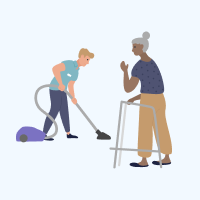Your aged care home is responsible to ensure you receive quality care and services. They have a responsibility:
- To respect your rights
Your rights are protected, no matter what type of care you receive and where you receive it. Your rights are outlined in the Charter of Aged Care Rights. - To provide you with quality services
Your provider must provide care that complies with the Aged Care Quality Standards. The standards reflect the level of care and services you can expect from your provider. Read more about the Aged Care Quality Standards.
How long do I have to find an aged care home?
Your approval for residential respite care will not lapse, but it can expire under specific circumstances. For instance, if your care needs change, you will need to be reassessed.
How do I check how much residential respite balance I have left?
To find out the remaining residential respite days you are entitled to, contact Services Australia on 1800 195 206 (free call) and then select Option 1.
How much is the booking fee?
Depending on the aged care home, a portion of the daily fee may need to be paid upfront as a booking fee. Booking fees cannot be more than the cost of one week’s care, or 25% of the total care; whichever is less. For example, if you book six weeks of care, the booking fee will be one week’s worth of daily fee.
What happens if I cancel my booking?
You are free to cancel your planned respite at any time.
- If you cancel more than seven days before your entry date, your booking fee will be repaid in full.
- If you cancel less than seven days before the entry date, the aged care home can retain all or part of the booking fee. This doesn’t apply under certain circumstances; for instance, if you're admitted to hospital.
Can I take leave from my aged care home?
There are no leave arrangements if you are receiving residential respite services. This includes hospital leave.
What if I’m having trouble paying the daily fee?
There is financial hardship assistance available if you are receiving residential respite. You can submit an application through the Services Australia website, or by phoning the Services Australia customer line on 1800 227 475.
What happens if I need emergency respite care?
Emergency admissions can occur, but rarely. In an emergency situation, you can receive residential respite care before approval by an assessment organisation. This will usually happen following a crisis - for example, there is no primary carer and there are no other options available. Your service provider will then arrange for an ACAT approval within 5 business days.
Can I extend the length of my stay at the aged care home?
Yes, there is the option of extending your stay by up to 21 days at a time. An application for an extension should be made through the ACAT. Extensions can be granted based on circumstances such as carer stress or absence, as well as your needs, abilities, and personal preferences. Your assessor will also consider if permanent residential care may be more suitable for you.
It’s the responsibility of your aged care home to keep track of your remaining allowance for respite care.
Can people visit me?
Yes. Family and friends can visit you while you receive respite care. Check the visitor policy of your aged care home for more information.
Can I visit family and friends?
Yes, you have the freedom to come and go as you please during the day, following any policies and guidelines your aged care home has. However, you cannot stay overnight away from the aged care home, as this is considered leaving the service.
What if I have a complaint?
If you are unhappy with any aspect of the care or services you receive, you have the right to make a complaint. Your first step should be to speak directly to your service provider, if you feel comfortable. They are there to support and listen to your concerns and take necessary action.
There are other options available too, including lodging a complaint with the Aged Care Quality and Safety Commission. Read more information on our Contact us page.
Advocacy
At any time you can get help from an advocate from the National Aged Care Advocacy Program. An advocate can help you by:
- listening to your concerns
- giving you information
- speaking up for you.
Read more on our advocacy page.


